Module 11 Unit 1 They touch noses! 习题课件+嵌入音频(共49张PPT)
文档属性
| 名称 | Module 11 Unit 1 They touch noses! 习题课件+嵌入音频(共49张PPT) |
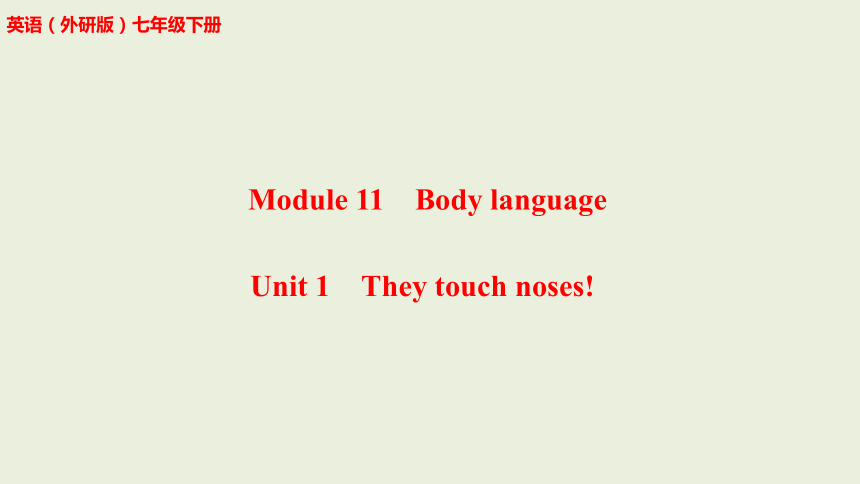
|
|
| 格式 | pptx | ||
| 文件大小 | 1.6MB | ||
| 资源类型 | 教案 | ||
| 版本资源 | 外研版 | ||
| 科目 | 英语 | ||
| 更新时间 | 2024-02-23 00:00:00 | ||
图片预览

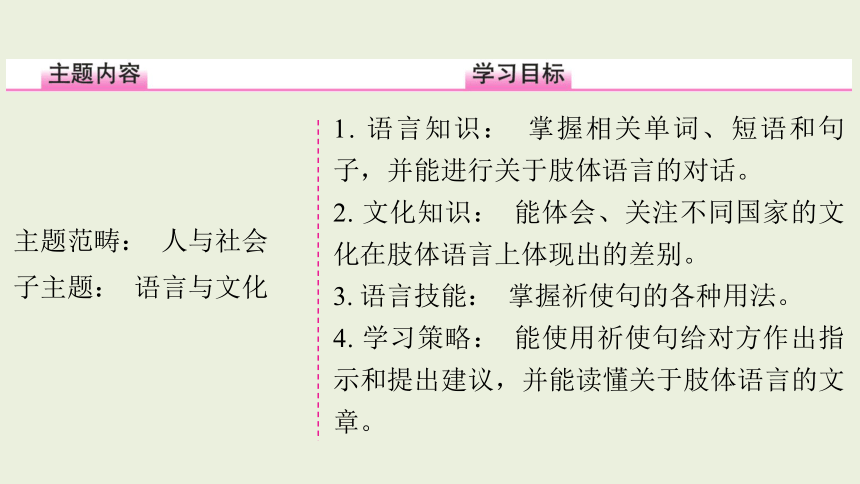
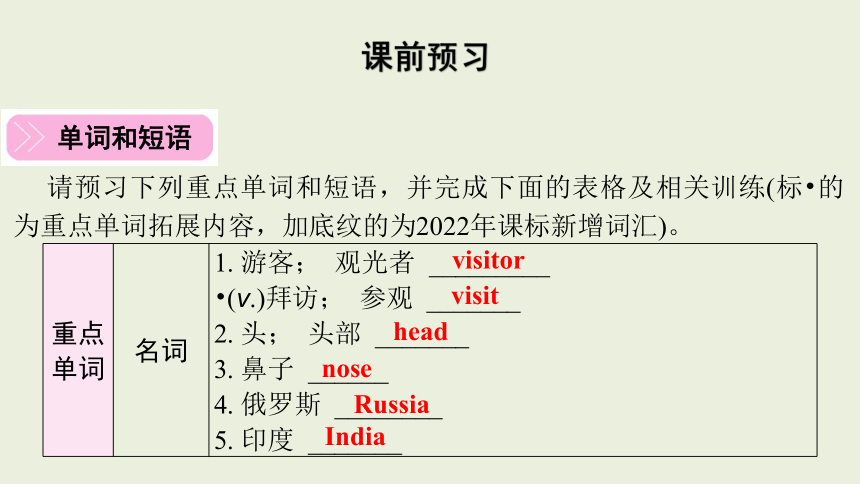
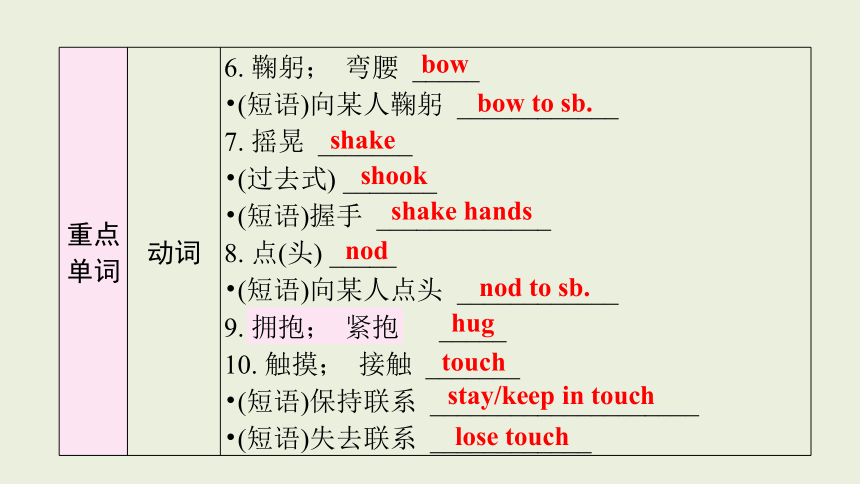
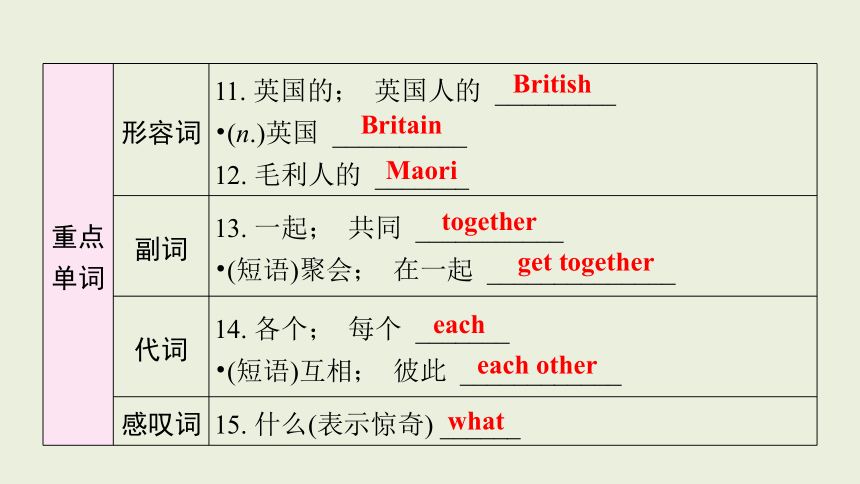
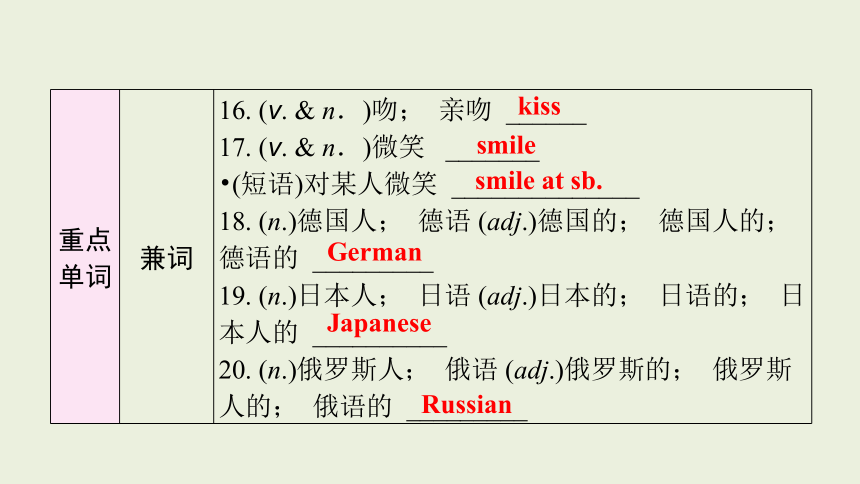
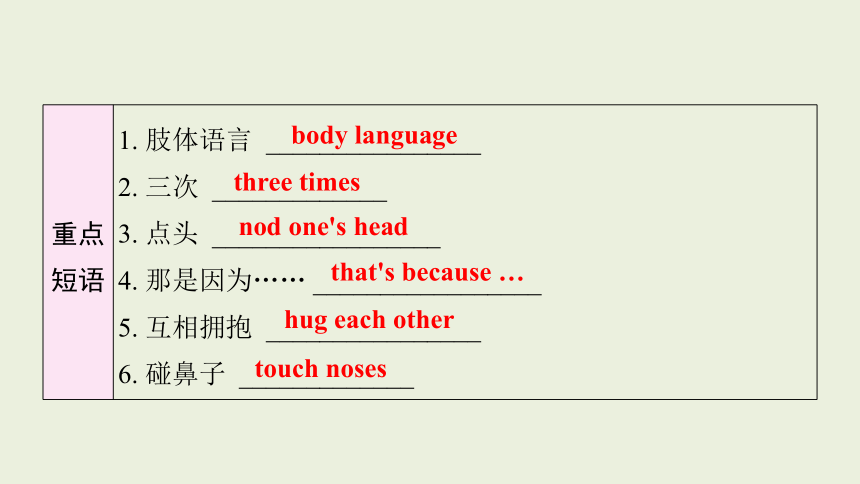
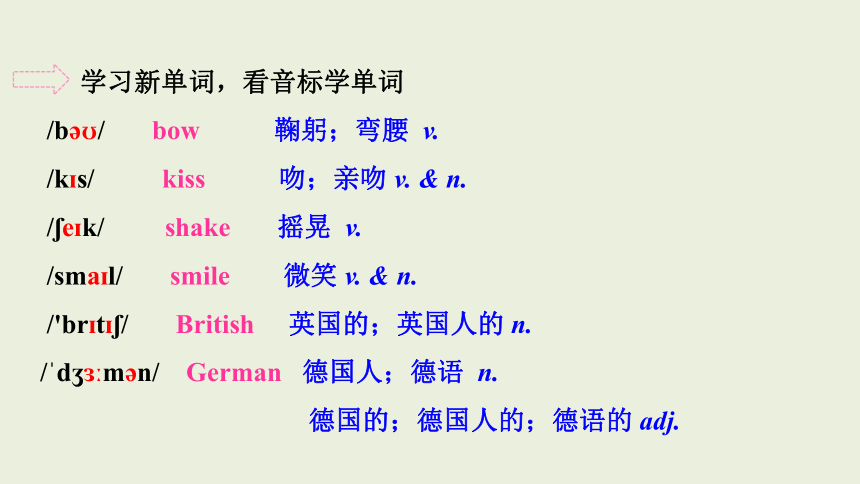
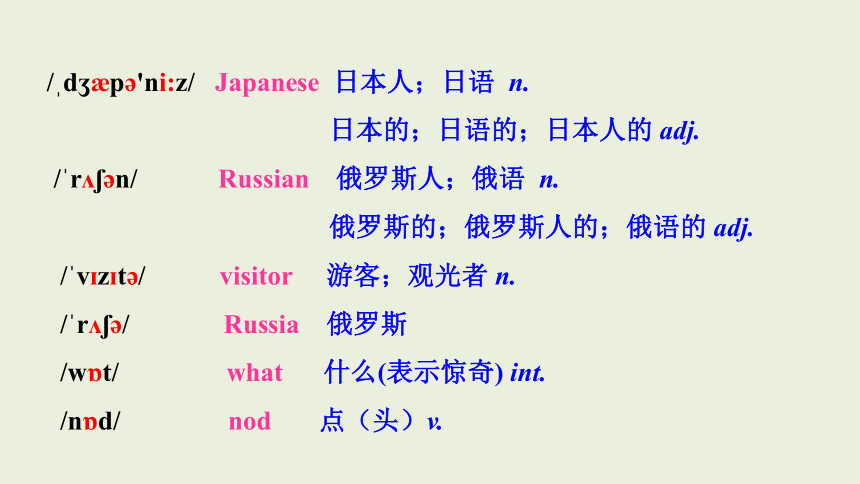
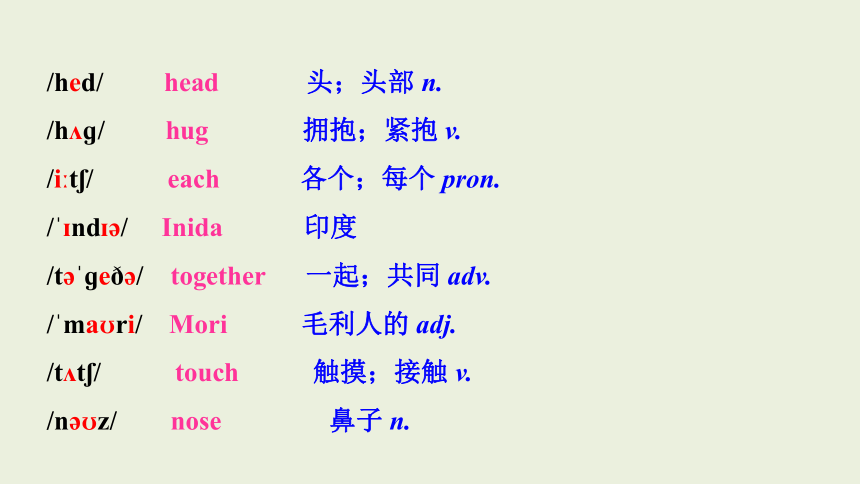
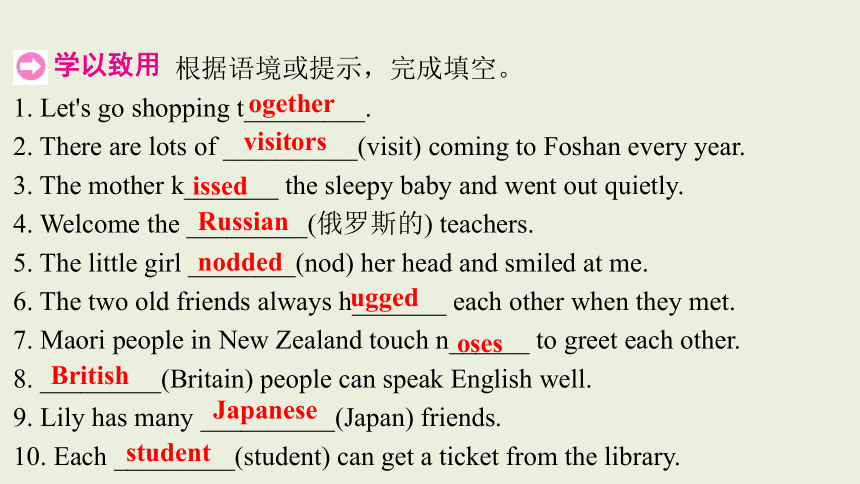
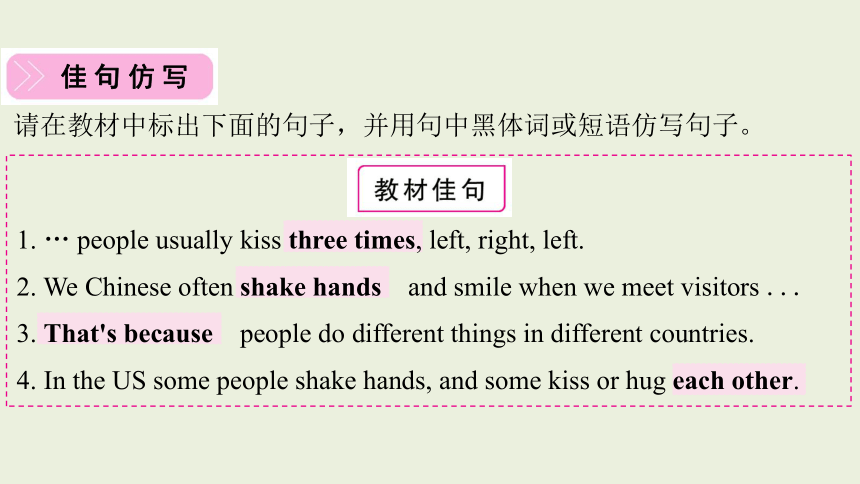
文档简介
(共49张PPT)
Module 11 Body language
英语(外研版)七年级下册
Unit 1 They touch noses!
主题范畴: 人与社会
子主题: 语言与文化
1. 语言知识: 掌握相关单词、短语和句子,并能进行关于肢体语言的对话。
2. 文化知识: 能体会、关注不同国家的文化在肢体语言上体现出的差别。
3. 语言技能: 掌握祈使句的各种用法。
4. 学习策略: 能使用祈使句给对方作出指示和提出建议,并能读懂关于肢体语言的文章。
单词和短语
请预习下列重点单词和短语,并完成下面的表格及相关训练(标 的为重点单词拓展内容,加底纹的为2022年课标新增词汇)。
重点 单词 名词 1. 游客; 观光者 _________
(v.)拜访; 参观 _______
2. 头; 头部 _______
3. 鼻子 ______
4. 俄罗斯 ________
5. 印度 _______
visitor
visit
head
nose
Russia
India
课前预习
重点 单词 动词 6. 鞠躬; 弯腰 _____
(短语)向某人鞠躬 ____________
7. 摇晃 _______
(过去式) _______
(短语)握手 _____________
8. 点(头) _____
(短语)向某人点头 ____________
9. 拥抱; 紧抱 _____
10. 触摸; 接触 _______
(短语)保持联系 ____________________
(短语)失去联系 ____________
bow
bow to sb.
shake
shook
shake hands
nod
nod to sb.
hug
touch
stay/keep in touch
lose touch
重点 单词 形容词 11. 英国的; 英国人的 _________
(n.)英国 __________
12. 毛利人的 _______
副词 13. 一起; 共同 ___________
(短语)聚会; 在一起 ______________
代词 14. 各个; 每个 _______
(短语)互相; 彼此 ____________
感叹词 15. 什么(表示惊奇) ______
British
Britain
Maori
together
get together
each
each other
what
重点 单词 兼词 16. (v. & n.)吻; 亲吻 ______
17. (v. & n.)微笑 _______
(短语)对某人微笑 ______________
18. (n.)德国人; 德语 (adj.)德国的; 德国人的; 德语的 _________
19. (n.)日本人; 日语 (adj.)日本的; 日语的; 日本人的 __________
20. (n.)俄罗斯人; 俄语 (adj.)俄罗斯的; 俄罗斯人的; 俄语的 _________
kiss
smile
smile at sb.
German
Japanese
Russian
重点 短语 1. 肢体语言 ________________
2. 三次 _____________
3. 点头 _________________
4. 那是因为…… _________________
5. 互相拥抱 ________________
6. 碰鼻子 _____________
body language
three times
nod one's head
that's because …
hug each other
touch noses
学习新单词,看音标学单词
/b / bow 鞠躬;弯腰 v.
/k s/ kiss 吻;亲吻 v. & n.
/ e k/ shake 摇晃 v.
/sma l/ smile 微笑 v. & n.
/'br t / British 英国的;英国人的 n.
/ d m n/ German 德国人;德语 n.
德国的;德国人的;德语的 adj.
/ d p 'ni:z/ Japanese 日本人;日语 n.
日本的;日语的;日本人的 adj.
/ r n/ Russian 俄罗斯人;俄语 n.
俄罗斯的;俄罗斯人的;俄语的 adj.
/ v z t / visitor 游客;观光者 n.
/ r / Russia 俄罗斯
/w t/ what 什么(表示惊奇) int.
/n d/ nod 点(头)v.
/hed/ head 头;头部 n.
/h ɡ/ hug 拥抱;紧抱 v.
/i t / each 各个;每个 pron.
/ nd / Inida 印度
/t ɡe / together 一起;共同 adv.
/ ma ri/ Mori 毛利人的 adj.
/t t / touch 触摸;接触 v.
/n z/ nose 鼻子 n.
根据语境或提示,完成填空。
1. Let's go shopping t_________.
2. There are lots of __________(visit) coming to Foshan every year.
3. The mother k_______ the sleepy baby and went out quietly.
4. Welcome the _________(俄罗斯的) teachers.
5. The little girl ________(nod) her head and smiled at me.
6. The two old friends always h_______ each other when they met.
7. Maori people in New Zealand touch n______ to greet each other.
8. _________(Britain) people can speak English well.
9. Lily has many __________(Japan) friends.
10. Each _________(student) can get a ticket from the library.
学以致用
ogether
visitors
issed
Russian
nodded
ugged
oses
British
Japanese
student
佳 句 仿 写
请在教材中标出下面的句子,并用句中黑体词或短语仿写句子。
1. … people usually kiss three times, left, right, left.
2. We Chinese often shake hands and smile when we meet visitors ...
3. That's because people do different things in different countries.
4. In the US some people shake hands, and some kiss or hug each other.
你需要将这个故事读三遍。
__________________________________________
他们第一次见面时握了手。
_____________________________________________________
那是因为你太年轻了。
____________________________________
我们要相互帮助。
_____________________________
You need to read the story three times.
They shook hands when they met for the first time.
That's because you are too young.
We should help each other.
听 说 训 练
一、 听选信息(Act. 2)
听对话,对话播放两遍。请根据所听到的问题和括号内的提示,选择正确的信息口头回答问题。
1. Where may the people who are saying hello and kissing be from (France / America / England)
_______________________________________________________________________
They/The people (who are saying hello and kissing) may be from France. /France.
课堂训练
2. What are the Russians doing (bowing / shaking hands / smiling)
____________________________________________________
3. How many groups of people are they talking about?(three / four / five)
_____________________________________________________________
They/The Russians are shaking hands. /Shaking hands.
They are talking about three groups of people. /Three (groups).
二、 回答问题(Act. 3)
听下面一段对话,对话播放两遍。请根据所听内容,口头回答问题。
1. How many times do Russian people kiss? _______________
2. What do Chinese never do when they meet visitors? __________________
3. In which country people put their hands together and nod their heads when they meet? _____________
4. What do Maori people do when they meet? __________________
Three times.
They never kiss.
(In) India.
They touch noses.
三、 口语训练
1. 请根据下面的线索复述文章大意。
2. 请结合你所积累的单词、短语和句子,尝试谈论你了解的其他肢体语言文化。可以从以下几个方面进行讲述:
(1)肢体语言在不同国家代表的不同意思;(2)你对肢体语言的看法。
______________________________________________________________________________________________________________________________________________________________________________________________________________________________________________________________________________________________________________________________________________________________________________________________________________
People may have different ideas about the same body language. It's polite to look at each other when we talk. But in some places, it isn't polite to do that. We usually nod to say “Yes”, but people in other places may not understand because they nod to say “No”. Japanese people bow to say “goodbye”. But in China, we usually wave our arms and say “goodbye”. So when we meet our visitors, we should learn their body language.
知 识 探 究
1
… people usually kiss three times, left, right, left. ……人们通常亲吻三次:左边,右边,左边。
【自主探究】 此处time作可数名词,意为“次数; 倍数”, 表示次数时常用于三次及三次以上。如: four times四次。time还可作不可数名词,意为“时间”。
表示次数的还有once “一次”,twice“两次”。对次数进行询问用“how many times”。如:
—How many times have you been to Beijing 你去过北京几次了?
—Twice. 两次。
【习题演练】
1. 这首诗我将读五遍。
I will read the poem ____________.
five times
2
We Chinese often shake hands and smile when we meet visitors, and sometimes we nod our heads. 我们中国人见到来访者的时候经常握手并微笑,有时会点头示意。
【自主探究1】
【自主探究2】 辨析 sometimes, some times, sometime与some time
词汇 含义及用法 例句
sometimes “有时”,是频率副词 He sometimes goes to school by bike. 他有时候骑自行车去上学。
some times “几次”,表示频率 He missed his son and cried some times. 他想念他儿子,哭了几次。
词汇 含义及用法 例句
sometime “某个时候”,指过去或将来的某个时候 I will see you sometime next week. 我下周某个时候去看你。
some time “某段时间”,常与for连用 My mother will stay in Beijing for some time. 我妈妈会在北京待一段时间。
【习题演练】
( )2. I hope to see you again ________ next year.
A. some time B. some times
C. sometime D. sometimes
( )3. Tony ________ speaks Chinese in English class.
A. some time B. some times
C. sometime D. sometimes
4. Peter smiled ____ the guest to show his politeness.
C
D
at
3
That's because people do different things in different countries. 那是因为不同国家的人们做法不同。
【自主探究】 that's because意为“那是因为……”,后面接表示原因的从句。如:That's because I can't speak English. 那是因为我不会说英语。
that's why意为“那就是为什么……”,why后接表示结果的从句。如:That's why he was careful with hot water. 那就是为什么他会很小心热水。
【习题演练】
5. 那是因为你学习不够努力。
________________ you didn't study hard enough.
That's because
【自主探究】 each other意为“互相; 彼此”。更多相关短语: learn from each other “互相学习”; help each other “互相帮助”; love each other “互相喜爱”。
【习题演练】
6. 同学之间应该互相帮助。
Classmates should __________________.
4
In the US some people shake hands, and some kiss or hug each other. 在美国,有些人握手,有些人亲吻或者互相拥抱。
help each other
【自主探究】 German作形容词,意为“德国的; 德国人的; 德语的”; 还可用作名词,意为“德国人; 德语”。
5
German 德国的
国家 国人(单数) 国人(复数)
Australia澳大利亚 Australian澳大利亚人 Australians澳大利亚人
Japan日本 Japanese日本人 Japanese日本人
America美国 American美国人 Americans美国人
国家 国人(单数) 国人(复数)
China中国 Chinese中国人 Chinese中国人
Russia俄罗斯 Russian俄罗斯人 Russians俄罗斯人
Germany德国 German德国人 Germans德国人
Canada加拿大 Canadian加拿大人 Canadians加拿大人
一、 单项填空
( )1. —What do Chinese do when they meet for the first time
—They usually ________.
A. touch noses B. kiss
C. shake hands D. bow
( )2. —What language do people in ________ speak
—________ speak English.
A. Americans; America B. America; Americans
C. American; America D. Americans; American
C
B
课堂检测
( )3. —Why don't you play games outside
—________ it's raining outside.
A. That's why B. That's right
C. That's because D. Because of
( )4. David has a big family. They love ________.
A. the others B. the other
C. another D. each other
C
D
( )5. —When will you take me to the zoo, Mum
—________ next month.
A. Sometime B. Sometimes
C. Some time D. Some times
A
二、 完成句子
1. 我们在小组里应该互相学习。
We should learn from ____________ in our groups.
2. 大明与他的朋友们见面时会握手。
Daming ______________ with his friends when they meet.
3. 他一周洗一次澡。
He takes a bath _____________.
each other
shakes hands
once a week
4. 我爸爸有时候开车去上班。
My father ___________ goes to work by car.
5. 这个问题我回答了三遍。
I answered this question _____________.
sometimes
three times
一、 单句选词填空
smile visit kiss nod touch hug bow shake
1. People often _____ to each other when they meet in Japan.
2. In China, _________ heads means “yes”.
3. Don't _______ the knife, because it's too dangerous.
4. Yangyang is _________ hands with his new friend over there.
bow
nodding
touch
shaking
提能训练
5. Mrs Xu is coming in the classroom with a big _______ on her face.
6. Thousands of __________ come to the park every week.
7. The mother ________ the baby on the head and puts him on the bed.
8. My mum gave me a big _____ when she met me at the station.
smile
visitors
kisses
hug
二、 单项填空
( )1. My friend, Eric, was born in London and he is ______.
A. Britain B. British
C. Japan D. Japanese
( )2. I ______ my head all the time, because I agree with you.
A. shake B. hold
C. nod D. show
B
C
( )3. Jason and Sam often help ______ when they're in trouble.
A. another B. each other
C. the other D. other
( )4. Jason comes from ______ and he is a ______.
A. German; Germany B. Germany; German
C. US; American D. the US; American
B
B
三、 完形填空
My mother asked me a question, “What is the most important part of the body?” I got different answers at different 1 .
( )1. A. ways B. ages
C. places D. years
B
When I was five years old, I thought the 2 was very important to us, so I said, “My ear, Mum.” But she shook her head and 3 no. Five years later, she asked me again. I thought that I 4 the right answer after thinking it over. So I told her, “Sight is very important to everyone, so it must be our eyes.” But she told me the answer was not 5 .
( )2. A. eye B. ear
C. nose D. mouth
( )3. A. spoke B. told
C. said D. wrote
( )4. A. got B. bought
C. received D. saw
( )5. A. difficult B. hard
C. cute D. right
B
C
A
D
When I was in a primary school, I tried 6 the question many times. But her answer was always the 7 . Till last year, when I was twenty-three, my grandma died. Everybody was crying. My mum 8 me and asked me this question then. “My son, the answer is your shoulder(肩膀). Everyone needs a shoulder to cry on.”
9 , I understand all she hopes is that I can have enough love and friends. In that way, I will have a shoulder to cry on when I need it. Thank you, Mum. You are my 10 . I love you forever.
( )6. A. thinking B. searching
C. asking D. answering
( )7. A. same B. different
C. strange D. wrong
( )8. A. looked at B. smiled at
C. pointed at D. found out
D
A
A
( )9. A. However B. Luckily
C. Finally D. Unluckily
( )10. A. teacher B. doctor
C. nurse D. police
C
A
四、 阅读理解
A
Body language is an important part of communication(交流). If a person is bored, he won't look at the person who is talking to him. He will find other things to do. He may also keep looking at his watch or a clock. If a person is open to you, his arms and legs will not be crossed(交叉的). And if a person is relaxed, you will know it by looking at his body, even his breathing(呼吸) is slower.
Here are some examples of body language:
Body language Feeling
Sitting with legs crossed Bored
Sitting with legs apart(分开的) Open, relaxed
Walking with hands in pockets, head down Sad
Putting hands to cheek(脸颊) Thinking
Hands clasped(握紧) behind back Angry
( )1. What may NOT a man do when he is bored
A. Look at the person who is talking to him.
B. Look at his watch.
C. Look at a clock.
D. Always look outside.
( )2. How can you know the man is relaxed or not
A. By asking him questions. B. By looking at his body.
C. By listening to his voice. D. By playing games with him.
A
B
( )3. If a person walks with hands in pockets and head down, he may feel ______.
A. happy B. sad
C. bored D. relaxed
( )4. Which kind of body language isn't mentioned(提到) in the passage
A. Sitting with legs crossed. B. Putting hands to cheek.
C. Look at his watch. D. Shake his head.
B
D
( )5. Where may you read the passage
A. In a storybook. B. On a school lost and found board.
C. In a culture magazine. D. On a sports website.
C
Module 11 Body language
英语(外研版)七年级下册
Unit 1 They touch noses!
主题范畴: 人与社会
子主题: 语言与文化
1. 语言知识: 掌握相关单词、短语和句子,并能进行关于肢体语言的对话。
2. 文化知识: 能体会、关注不同国家的文化在肢体语言上体现出的差别。
3. 语言技能: 掌握祈使句的各种用法。
4. 学习策略: 能使用祈使句给对方作出指示和提出建议,并能读懂关于肢体语言的文章。
单词和短语
请预习下列重点单词和短语,并完成下面的表格及相关训练(标 的为重点单词拓展内容,加底纹的为2022年课标新增词汇)。
重点 单词 名词 1. 游客; 观光者 _________
(v.)拜访; 参观 _______
2. 头; 头部 _______
3. 鼻子 ______
4. 俄罗斯 ________
5. 印度 _______
visitor
visit
head
nose
Russia
India
课前预习
重点 单词 动词 6. 鞠躬; 弯腰 _____
(短语)向某人鞠躬 ____________
7. 摇晃 _______
(过去式) _______
(短语)握手 _____________
8. 点(头) _____
(短语)向某人点头 ____________
9. 拥抱; 紧抱 _____
10. 触摸; 接触 _______
(短语)保持联系 ____________________
(短语)失去联系 ____________
bow
bow to sb.
shake
shook
shake hands
nod
nod to sb.
hug
touch
stay/keep in touch
lose touch
重点 单词 形容词 11. 英国的; 英国人的 _________
(n.)英国 __________
12. 毛利人的 _______
副词 13. 一起; 共同 ___________
(短语)聚会; 在一起 ______________
代词 14. 各个; 每个 _______
(短语)互相; 彼此 ____________
感叹词 15. 什么(表示惊奇) ______
British
Britain
Maori
together
get together
each
each other
what
重点 单词 兼词 16. (v. & n.)吻; 亲吻 ______
17. (v. & n.)微笑 _______
(短语)对某人微笑 ______________
18. (n.)德国人; 德语 (adj.)德国的; 德国人的; 德语的 _________
19. (n.)日本人; 日语 (adj.)日本的; 日语的; 日本人的 __________
20. (n.)俄罗斯人; 俄语 (adj.)俄罗斯的; 俄罗斯人的; 俄语的 _________
kiss
smile
smile at sb.
German
Japanese
Russian
重点 短语 1. 肢体语言 ________________
2. 三次 _____________
3. 点头 _________________
4. 那是因为…… _________________
5. 互相拥抱 ________________
6. 碰鼻子 _____________
body language
three times
nod one's head
that's because …
hug each other
touch noses
学习新单词,看音标学单词
/b / bow 鞠躬;弯腰 v.
/k s/ kiss 吻;亲吻 v. & n.
/ e k/ shake 摇晃 v.
/sma l/ smile 微笑 v. & n.
/'br t / British 英国的;英国人的 n.
/ d m n/ German 德国人;德语 n.
德国的;德国人的;德语的 adj.
/ d p 'ni:z/ Japanese 日本人;日语 n.
日本的;日语的;日本人的 adj.
/ r n/ Russian 俄罗斯人;俄语 n.
俄罗斯的;俄罗斯人的;俄语的 adj.
/ v z t / visitor 游客;观光者 n.
/ r / Russia 俄罗斯
/w t/ what 什么(表示惊奇) int.
/n d/ nod 点(头)v.
/hed/ head 头;头部 n.
/h ɡ/ hug 拥抱;紧抱 v.
/i t / each 各个;每个 pron.
/ nd / Inida 印度
/t ɡe / together 一起;共同 adv.
/ ma ri/ Mori 毛利人的 adj.
/t t / touch 触摸;接触 v.
/n z/ nose 鼻子 n.
根据语境或提示,完成填空。
1. Let's go shopping t_________.
2. There are lots of __________(visit) coming to Foshan every year.
3. The mother k_______ the sleepy baby and went out quietly.
4. Welcome the _________(俄罗斯的) teachers.
5. The little girl ________(nod) her head and smiled at me.
6. The two old friends always h_______ each other when they met.
7. Maori people in New Zealand touch n______ to greet each other.
8. _________(Britain) people can speak English well.
9. Lily has many __________(Japan) friends.
10. Each _________(student) can get a ticket from the library.
学以致用
ogether
visitors
issed
Russian
nodded
ugged
oses
British
Japanese
student
佳 句 仿 写
请在教材中标出下面的句子,并用句中黑体词或短语仿写句子。
1. … people usually kiss three times, left, right, left.
2. We Chinese often shake hands and smile when we meet visitors ...
3. That's because people do different things in different countries.
4. In the US some people shake hands, and some kiss or hug each other.
你需要将这个故事读三遍。
__________________________________________
他们第一次见面时握了手。
_____________________________________________________
那是因为你太年轻了。
____________________________________
我们要相互帮助。
_____________________________
You need to read the story three times.
They shook hands when they met for the first time.
That's because you are too young.
We should help each other.
听 说 训 练
一、 听选信息(Act. 2)
听对话,对话播放两遍。请根据所听到的问题和括号内的提示,选择正确的信息口头回答问题。
1. Where may the people who are saying hello and kissing be from (France / America / England)
_______________________________________________________________________
They/The people (who are saying hello and kissing) may be from France. /France.
课堂训练
2. What are the Russians doing (bowing / shaking hands / smiling)
____________________________________________________
3. How many groups of people are they talking about?(three / four / five)
_____________________________________________________________
They/The Russians are shaking hands. /Shaking hands.
They are talking about three groups of people. /Three (groups).
二、 回答问题(Act. 3)
听下面一段对话,对话播放两遍。请根据所听内容,口头回答问题。
1. How many times do Russian people kiss? _______________
2. What do Chinese never do when they meet visitors? __________________
3. In which country people put their hands together and nod their heads when they meet? _____________
4. What do Maori people do when they meet? __________________
Three times.
They never kiss.
(In) India.
They touch noses.
三、 口语训练
1. 请根据下面的线索复述文章大意。
2. 请结合你所积累的单词、短语和句子,尝试谈论你了解的其他肢体语言文化。可以从以下几个方面进行讲述:
(1)肢体语言在不同国家代表的不同意思;(2)你对肢体语言的看法。
______________________________________________________________________________________________________________________________________________________________________________________________________________________________________________________________________________________________________________________________________________________________________________________________________________
People may have different ideas about the same body language. It's polite to look at each other when we talk. But in some places, it isn't polite to do that. We usually nod to say “Yes”, but people in other places may not understand because they nod to say “No”. Japanese people bow to say “goodbye”. But in China, we usually wave our arms and say “goodbye”. So when we meet our visitors, we should learn their body language.
知 识 探 究
1
… people usually kiss three times, left, right, left. ……人们通常亲吻三次:左边,右边,左边。
【自主探究】 此处time作可数名词,意为“次数; 倍数”, 表示次数时常用于三次及三次以上。如: four times四次。time还可作不可数名词,意为“时间”。
表示次数的还有once “一次”,twice“两次”。对次数进行询问用“how many times”。如:
—How many times have you been to Beijing 你去过北京几次了?
—Twice. 两次。
【习题演练】
1. 这首诗我将读五遍。
I will read the poem ____________.
five times
2
We Chinese often shake hands and smile when we meet visitors, and sometimes we nod our heads. 我们中国人见到来访者的时候经常握手并微笑,有时会点头示意。
【自主探究1】
【自主探究2】 辨析 sometimes, some times, sometime与some time
词汇 含义及用法 例句
sometimes “有时”,是频率副词 He sometimes goes to school by bike. 他有时候骑自行车去上学。
some times “几次”,表示频率 He missed his son and cried some times. 他想念他儿子,哭了几次。
词汇 含义及用法 例句
sometime “某个时候”,指过去或将来的某个时候 I will see you sometime next week. 我下周某个时候去看你。
some time “某段时间”,常与for连用 My mother will stay in Beijing for some time. 我妈妈会在北京待一段时间。
【习题演练】
( )2. I hope to see you again ________ next year.
A. some time B. some times
C. sometime D. sometimes
( )3. Tony ________ speaks Chinese in English class.
A. some time B. some times
C. sometime D. sometimes
4. Peter smiled ____ the guest to show his politeness.
C
D
at
3
That's because people do different things in different countries. 那是因为不同国家的人们做法不同。
【自主探究】 that's because意为“那是因为……”,后面接表示原因的从句。如:That's because I can't speak English. 那是因为我不会说英语。
that's why意为“那就是为什么……”,why后接表示结果的从句。如:That's why he was careful with hot water. 那就是为什么他会很小心热水。
【习题演练】
5. 那是因为你学习不够努力。
________________ you didn't study hard enough.
That's because
【自主探究】 each other意为“互相; 彼此”。更多相关短语: learn from each other “互相学习”; help each other “互相帮助”; love each other “互相喜爱”。
【习题演练】
6. 同学之间应该互相帮助。
Classmates should __________________.
4
In the US some people shake hands, and some kiss or hug each other. 在美国,有些人握手,有些人亲吻或者互相拥抱。
help each other
【自主探究】 German作形容词,意为“德国的; 德国人的; 德语的”; 还可用作名词,意为“德国人; 德语”。
5
German 德国的
国家 国人(单数) 国人(复数)
Australia澳大利亚 Australian澳大利亚人 Australians澳大利亚人
Japan日本 Japanese日本人 Japanese日本人
America美国 American美国人 Americans美国人
国家 国人(单数) 国人(复数)
China中国 Chinese中国人 Chinese中国人
Russia俄罗斯 Russian俄罗斯人 Russians俄罗斯人
Germany德国 German德国人 Germans德国人
Canada加拿大 Canadian加拿大人 Canadians加拿大人
一、 单项填空
( )1. —What do Chinese do when they meet for the first time
—They usually ________.
A. touch noses B. kiss
C. shake hands D. bow
( )2. —What language do people in ________ speak
—________ speak English.
A. Americans; America B. America; Americans
C. American; America D. Americans; American
C
B
课堂检测
( )3. —Why don't you play games outside
—________ it's raining outside.
A. That's why B. That's right
C. That's because D. Because of
( )4. David has a big family. They love ________.
A. the others B. the other
C. another D. each other
C
D
( )5. —When will you take me to the zoo, Mum
—________ next month.
A. Sometime B. Sometimes
C. Some time D. Some times
A
二、 完成句子
1. 我们在小组里应该互相学习。
We should learn from ____________ in our groups.
2. 大明与他的朋友们见面时会握手。
Daming ______________ with his friends when they meet.
3. 他一周洗一次澡。
He takes a bath _____________.
each other
shakes hands
once a week
4. 我爸爸有时候开车去上班。
My father ___________ goes to work by car.
5. 这个问题我回答了三遍。
I answered this question _____________.
sometimes
three times
一、 单句选词填空
smile visit kiss nod touch hug bow shake
1. People often _____ to each other when they meet in Japan.
2. In China, _________ heads means “yes”.
3. Don't _______ the knife, because it's too dangerous.
4. Yangyang is _________ hands with his new friend over there.
bow
nodding
touch
shaking
提能训练
5. Mrs Xu is coming in the classroom with a big _______ on her face.
6. Thousands of __________ come to the park every week.
7. The mother ________ the baby on the head and puts him on the bed.
8. My mum gave me a big _____ when she met me at the station.
smile
visitors
kisses
hug
二、 单项填空
( )1. My friend, Eric, was born in London and he is ______.
A. Britain B. British
C. Japan D. Japanese
( )2. I ______ my head all the time, because I agree with you.
A. shake B. hold
C. nod D. show
B
C
( )3. Jason and Sam often help ______ when they're in trouble.
A. another B. each other
C. the other D. other
( )4. Jason comes from ______ and he is a ______.
A. German; Germany B. Germany; German
C. US; American D. the US; American
B
B
三、 完形填空
My mother asked me a question, “What is the most important part of the body?” I got different answers at different 1 .
( )1. A. ways B. ages
C. places D. years
B
When I was five years old, I thought the 2 was very important to us, so I said, “My ear, Mum.” But she shook her head and 3 no. Five years later, she asked me again. I thought that I 4 the right answer after thinking it over. So I told her, “Sight is very important to everyone, so it must be our eyes.” But she told me the answer was not 5 .
( )2. A. eye B. ear
C. nose D. mouth
( )3. A. spoke B. told
C. said D. wrote
( )4. A. got B. bought
C. received D. saw
( )5. A. difficult B. hard
C. cute D. right
B
C
A
D
When I was in a primary school, I tried 6 the question many times. But her answer was always the 7 . Till last year, when I was twenty-three, my grandma died. Everybody was crying. My mum 8 me and asked me this question then. “My son, the answer is your shoulder(肩膀). Everyone needs a shoulder to cry on.”
9 , I understand all she hopes is that I can have enough love and friends. In that way, I will have a shoulder to cry on when I need it. Thank you, Mum. You are my 10 . I love you forever.
( )6. A. thinking B. searching
C. asking D. answering
( )7. A. same B. different
C. strange D. wrong
( )8. A. looked at B. smiled at
C. pointed at D. found out
D
A
A
( )9. A. However B. Luckily
C. Finally D. Unluckily
( )10. A. teacher B. doctor
C. nurse D. police
C
A
四、 阅读理解
A
Body language is an important part of communication(交流). If a person is bored, he won't look at the person who is talking to him. He will find other things to do. He may also keep looking at his watch or a clock. If a person is open to you, his arms and legs will not be crossed(交叉的). And if a person is relaxed, you will know it by looking at his body, even his breathing(呼吸) is slower.
Here are some examples of body language:
Body language Feeling
Sitting with legs crossed Bored
Sitting with legs apart(分开的) Open, relaxed
Walking with hands in pockets, head down Sad
Putting hands to cheek(脸颊) Thinking
Hands clasped(握紧) behind back Angry
( )1. What may NOT a man do when he is bored
A. Look at the person who is talking to him.
B. Look at his watch.
C. Look at a clock.
D. Always look outside.
( )2. How can you know the man is relaxed or not
A. By asking him questions. B. By looking at his body.
C. By listening to his voice. D. By playing games with him.
A
B
( )3. If a person walks with hands in pockets and head down, he may feel ______.
A. happy B. sad
C. bored D. relaxed
( )4. Which kind of body language isn't mentioned(提到) in the passage
A. Sitting with legs crossed. B. Putting hands to cheek.
C. Look at his watch. D. Shake his head.
B
D
( )5. Where may you read the passage
A. In a storybook. B. On a school lost and found board.
C. In a culture magazine. D. On a sports website.
C
同课章节目录
- Module 1 Lost and found
- Unit 1 Whose bag is this?
- Unit 2 Are they yours?
- Unit 3 Language in use
- Module 2 What can you do ?
- Unit 1 I can play the piano
- Unit 2 I can run really fast
- Unit 3 Language in use
- Module 3 Making plans
- Unit 1 What are you going to do at the weekends?
- Unit 2 We're going to cheer the players.
- Unit 3 Language in use
- Module 4 Life in the future
- Unit 1 Everyone will study at home
- Unit 2 Every family will have a small plane.
- Unit 3 Language in use
- Module 5 Shopping
- Unit 1 What can I do for you?
- Unit 2 You can buy everything on the Internet
- Unit 3 Language in use
- Module 6 Around town
- Unit 1 Could you tell me how to get to the Nationa
- Unit 2 The London Eye is on your right.
- Unit 3 Language in use
- Revision module A
- Module 7 My past life
- Unit 1 I was born in a small village.
- Unit 2 I was born in Quincy.
- Unit 3 Language in use
- Module 8 Story time
- Unit 1 Once upon a time….
- Unit 2 Goldilocks hurried out of the house.
- Unit 3 Language in use
- Module 9 Life history
- Unit 1 He left school and began work at the age of
- Unit 2 He decided to be an actor.
- Unit 3 Language in use
- Module 10 A holiday journey
- Unit 1 What did you do?
- Unit 2 This morning we took a walk.
- Unit 3 Language in use
- Module 11 Body language
- Unit 1 They touch noses!
- Unit 2 Here are some ways to welcome them.
- Unit 3 Language in use
- Module 12 Western music
- Unit 1 It's so beautiful!
- Unit 2 Vienna is the centre of European classical
- Unit 3 Language in use
- Revision module B
